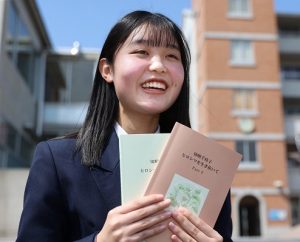Hiroshima Voices: “No Nukes, No War” Ayaka Yamanaka, 17, chair, Human Rights Club, Eishin Junior/Senior High School, Fukuyama City
Apr. 12, 2023
“Young people around the world, let’s band together and take action!”
As a first-year student, Ayaka Yamanaka joined the Human Rights Club at Eishin Junior and Senior High School, located in Fukuyama City. Members of the club spend their time looking into peace and human rights issues and engaging in volunteer activities. She served as a volunteer guide at the Holocaust Education Center, located in Fukuyama. She has listened to the stories of A-bomb survivors and people who experienced the war from Hiroshima, Nagasaki, and Okinawa prefectures. Ms. Yamanaka also has been involved in such activities as a signature drive for the elimination of nuclear weapons and made presentations at events to promote peace.
Click here to view the video
More than a year has passed since the Russian invasion of Ukraine, and I continue to think about how this war can be ended. People in the war zone have had their daily lives, their futures, and their dreams upended. It is excruciating to imagine what that must be like.
The International Criminal Court (ICC) has issued an arrest warrant for Russian President Vladimir Putin on suspicion of involvement in the removal of children from Ukraine. It is said those children have been taken to educational facilities and are suffering confinement and violence. I am so angry, I sometimes cannot hold back my tears. Why do they do such things to children who still have their futures in front of them? Why can’t those children just sit at their desks and take classes like we are able to do? The emotions that well up inside me are overwhelming.
Since entering this school, I have listened to numerous talks by Chieko Kiriake, (93, a resident of Asaminami Ward, Hiroshima). She was 15 when she experienced the atomic bombing. Based on her recollections of the appearance of people after the atomic bombing, she has explained how “their uniforms were burned, and they were nearly naked. Their skin was dangling from the tips of their fingers and feet like long seaweed that had been soaked in muddy water.” She has said, “Peace doesn’t mean anything if you’re dead. I would never allow you to die at the hands of war or nuclear weapons.” When Ms. Kiriake’s accounts were published, I helped annotate the book. I selected wording that young children would be able to understand. The publication serves as a baton that can be passed on to succeeding generations.
Those who communicate stories to the public about the Battle of Okinawa, together with the A-bomb survivors in Nagasaki, continue to emphasize the preciousness of life. We are the last generation to have the opportunity to listen to the accounts of the A-bomb survivors directly from them. Now is time for us to reflect on the weight and meaning of their words and act.
I ask that people don’t view our actions with indifference and stop at praising us for our “commitment.” I hope that young people around the world can take in the testimonies of A-bomb survivors as well as news of the war and band with us to take action.
Before the summit of the Group of Seven industrialized nations is held in Hiroshima, we plan on sending letters to the embassies of the United States and other participating nations. I will call on the leaders to not allow nuclear weapons to be used in any way in this war. I hope that leaders at the summit can have concrete deliberations involving the abolition of nuclear weapons. There should be no more A-bombed cities. I also continue to hope that the people of Ukraine and Russia can regain their everyday lives.
(Interview by Mio Hara)








